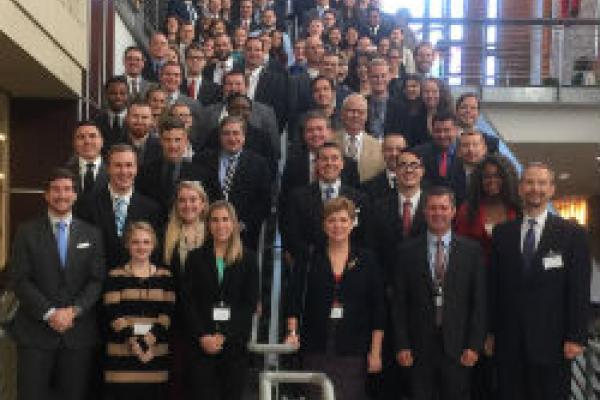International Studies Students Participate in The Ohio State National Security Simulation

Each year, Professor Dakota Rudesill of Ohio State’s Moritz College of Law organizes The Ohio State National Security Simulation. No other university has a national security exercise that is as realistic, intense, and inter-disciplinary. Four International Studies students, Rowan Croswell, Alex Lebowitz, Anna Maloney, and Andrew Wells, participated in the November, 2016 Simulation. Andrew Wells, a senior graduating in Spring 2017, provides this account of the experience.
The Simulation provides two days of intensive training in real world professional skills for students from across the University. Students from a half dozen professional, graduate, and undergraduate programs cooperate with seasoned practitioners from Washington DC and the Ohio State faculty to play their respective roles in advising senior practitioners in all three branches of government, plus state and local government and the press, as they respond to a series of realistic national security crises. Students with law, policy, intelligence, military, and media professional competencies must communicate across professional lines and work together to devise a strategy to respond to the security threats. They must juggle pressures of time, personality, ethics, secrecy and information management, and the decisions they make, or do not make, have consequences for the simulation’s outcome.
I was fortunate enough to be part of the November 2016 simulation and gain insight into the workings of the highest levels of our country’s national security establishment. It was an exciting and remarkable learning experience. Participants in the simulation play a role related to their area of study. They must work as a team with players from other fields who bring different skills, knowledge, and assumptions to their work.
The simulation includes not only students from half a dozen Ohio State programs, but also Ohio State alumni and seasoned practitioners from around the country. For example, Senators were played by retired federal and state lawmakers, and advised by students in staff roles. Ohio State alumna Colleen McMahon, the Chief Judge of the U.S. District Court for the Southern District of New York, role played a federal judge, reviewing surveillance and intelligence programs for legality. The practitioners playing the President, Vice President, and National Security Advisor all have extensive Washington experience at high levels, and here worked with students in roles in federal agencies. There were real retired generals interacting with us. It was an amazing learning and professional networking experience.
The simulation takes place over two days and the participants fully immerse themselves in tackling the national security crisis scenarios that the organizers create. The scenarios themselves are firmly rooted in real world events so participants can bring their knowledge of current events to bear on the role they play right from the start.
During the simulation, I served as Director of the National Security Agency (NSA) and Commander of CYBERCOM. Through this role I was tasked with making decisions about intelligence collection programs, analyzing the information they gathered, and advising other players about what the intelligence is telling us, in real time. I was responsible for defending the United States against cyber threats, and ordering cyber attacks. It was thrilling to assume the role of someone in control of some of our nation’s most advanced espionage capabilities and the intelligence collection opportunities that they offer. I reviewed and assessed intelligence reports, while assisting in the creation of multiple Presidential Daily Briefs (PDBs) on Intelligence for the President and players on the National Security Council (NSC).
The individual who I worked with the closest was my legal counsel. This role was filled by a law student of Professor Rudesill’s. His responsibility was to advise me about the legality of decisions I made. I also worked very closely with the CIA players and other members of the U.S. Intelligence Community, under the coordination of a graduate student who played the Director of National Intelligence (DNI). We tackled issues as a team and it gave us the opportunity to practice appropriate information sharing amongst government entities.
It was a highly rewarding and exciting experience to assume the role of a top-level individual in the Intelligence Community during the National Security Simulation. The experience allowed me to learn and understand the responsibilities of a position that requires me to act outside of my normal personality to serve the needs of the White House, Congress, the courts, and the country.
I honed my skills in assessing information and identifying the key facts, while working collaboratively with a team to share knowledge and come to often hard decisions on different issues. My decisions throughout the simulation resulted in observable consequences and offered the opportunity to reflect on my strengths and weaknesses in intelligence analysis, and as a future professional. The simulation also offered a realistic opportunity to practice the proper handling and sharing of classified information.
I hope that I can participate in the simulation again in the future and highly recommend the experience to anyone who is given the opportunity to participate.
